The February 25, 2023 2nd Annual Conference registration is now open. Join Dr. John Harbo, Dr. Jamie Ellis, Michael Bush, Les Crowder, Robyn Underwood, and many more!
Members have annual access!
The Inaugural SBGMI Winter Virtual Conference is brought to you by Northern Bee Books and the Natural Bee Husbandry Magazine. Special thanks also to Flanary Ridge Honey, LLC. and Buggsnest, LLC.
Please join us March 5th, 2022 beginning at 9:30am(est) and ending at 7:00pm(est) for a live and interactive conference featuring eight dynamic and exciting speakers. Registered attendees will receive one year of group membership to the Sustainable Beekeepers Guild of Michigan which includes a complimentary six-month digital subscription to the Natural Bee Husbandry magazine, access to conference recordings, access to our local lending library, and access to the Sustainable Beekeepers Guild Forum upon launch!
Ticketing
Price: $35 (includes annual individual SBGMI membership, access to conference digital recording, 6-month NBH subscription, plus more) ALL TICKET HOLDERS RECEIVE ACCESS TO DIGITAL CONFERENCE RECORDING!
Discounted Price for Existing SBGMI Members: $25
The Nuts and Bolts
Registrants will receive confirmation of their purchase and access to conference link upon completion of checkout via email. Please be sure to check spam/junk folders for this information upon completion of purchase. Registrants will continue to have access to recorded materials in the SBGMI members area for the duration of their annual membership included in purchase price.
- This meeting will be digitally hosted and broadcast live via ZOOM.
- Ticket proceeds from this event will go toward expenses incurred in hosting, speaker fees, SBGMI club activities and membership development.
- Registrants will receive meeting event information upon completion of ticket purchase and additionally register via ZOOM.
- Sales are final and non-refundable.
- Speaker and scheduling changes may occur.
- User side technical difficulties are the responsibility of the end-user and not the SBGMI or its presenters.
Virtual Conference Purpose
SBGMI was founded out of a desire to see an alternative to the permeation of prophylactic and systemic chemical treatment education and practice for mites (Varroa destructor) in modern beekeeping. The simple objective is to equip beekeepers with knowledge to reduce the dependence on these toxic interventions and facilitate sustainable beekeeping that trends toward better bred bees. We strive to ensure our members receive the support, resources, and opportunities needed to prosper along with their bees. This conference serves to bring together those who know, those who want to grow, and those curious about the path toward treatment-free beekeeping and sustainability in their own apiary!
You will learn from beekeepers who have successfully kept bees in a manner that is within the spirit of the SBGMI Mission. You will also learn about core principles from our speakers on best practices, grow your apiary sustainably while focusing on a chemical-free, natural approach to beekeeping. This conference will provide you with a new perspective, tools, and inspiration to implement the same into your current practice. Whether you are just starting out or looking to make some changes, these speakers will equip you with new and refreshed tools to better your practice and apiary! Our speakers are of good repute and plan to share their habits and philosophies that have enabled them to replicate success in their own apiaries while striving and achieving sustainability whilst remaining free of chemicals.
Featured Speakers
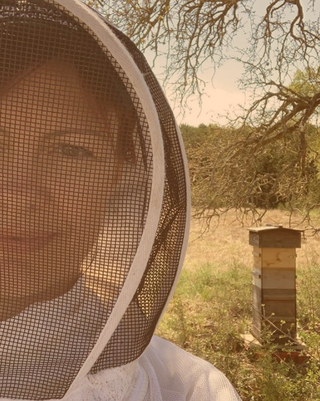
“Preventing or Trouble-Shooting Pests and Pathogens” 10:30am – 11:30am (EST)
Nathalie B. will present on using Integrated Pest Management science to prevent and/or trouble-shoot pests and pathogens of the honey bee, including the dreaded Varroa Mites. You will be equipped with best practices to successfully manage your colonies and apiaries organically. (www.Bee-Mindful.com)

“Common Beekeeping Problems” 11:30am – 12:30pm (EST)
Michael Bush will provide insight into problems experienced by new and old beekeepers alike as they foray into beekeeping. Problems with brood, queen cells, laying workers, and strange smells are just some of the topics he’ll cover in this concise and easy to understand presentation. (www.bushfarms.com)
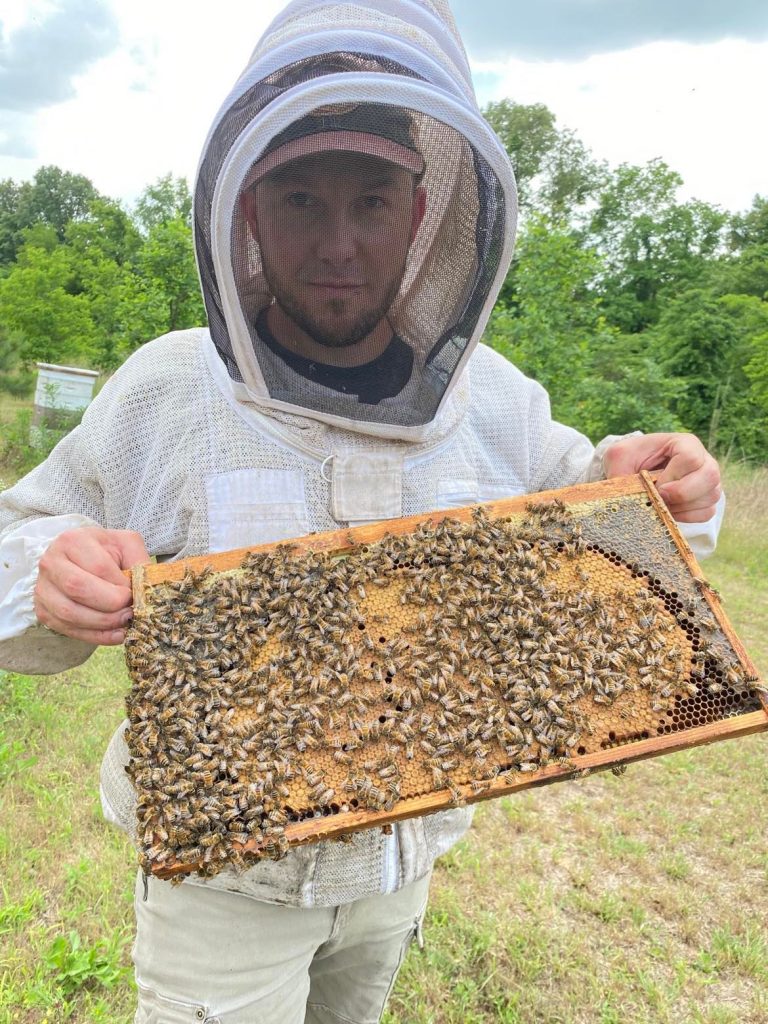
“The Reality of a Sustainable Apiary, VSH, and Queen Management” 2:30pm – 3:30pm (EST)
Cory Stevens will teach us about his endeavor into treatment free beekeeping and motivations for sustainable practices. He will discuss how he set goals to progress toward sustainability and provide important tips for hobbyists and sideliners interested in their own VSH queen rearing. (www.stevensbeeco.com)
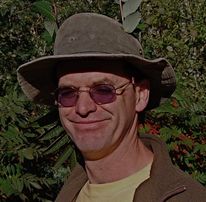
“Biotechnical Mite Management – Sustainable Solutions for the Hobbyist and Sideliner” 3:30pm – 4:30pm (EST)
Adrian Quiney will teach us from his beekeeping practices and methods how to exploit the weaknesses of the mite and control it without the use of chemicals. Wintering in Northern Wisconsin, he boasts an overall 75% success rate since 2008. (Quiney Honey and Bee)

“Honey Bees and the Human Connection” 4:45pm – 5:45pm (EST)
Les Crowder will share his tips on how to work with the bees instead of against them. By practicing beekeeping many hours for 5 decades, usually without gloves, he has learned from the bees how to approach, open and move around a beehive full of stinging insects without fear. (www.lescrowder.com)

“Sustainable Beekeeping Through Selective Stock Improvement Utilizing Natural Selection” 5:45pm – 7:00pm (EST)
Terry Combs has been a beekeeper over 56 years. He will outline a standard beekeeping season and goalposts. His focal points are emphasizing education, biology, location, environment, and a surviving maternal lineage resistant to Varroa-destructor without dependence on chemicals. (Author Page)
Guest Speakers
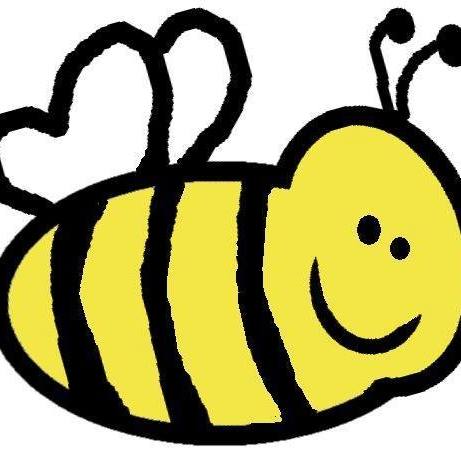
10:00am (EST) Keith Lazar of Buggsnest, LLC. will share with us some of the primary needs of a new beekeeper and supplies needed to get started on their new adventures in beekeeping. Keith Lazar is the owner of Buggsnest LLC Beekeeping Supplies. He operates out of Livonia, MI. Being an experienced beekeeper for the last 25 years, his vast experience and insight into his products qualify him to lend an expert hand to both novice and veteran beekeepers!

1:30pm (EST) William Le Ferrand comes to us live from France to discuss Bee Friendly Automated Mite Monitoring. Hybridizing beekeeping and engineering, William has devised an ingenious method for scalable mite monitoring practices that keeps the beekeeper and honey bee in mind. William’s ingenuity has many practical applications for those interested in efficient monitoring for selection in their apiaries (watch a demo here).
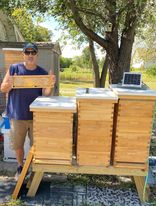
TBD (EST) Ryan is a long-time beekeeper with 40 years of experience. He is the proprietor of Flanary Ridge Honey, LLC. in Flat Rock, MI. For the last fourteen years he has specialized in providing beekeeping equipment, packages, and nucleus colonies to beekeepers all over Southeast Michigan. He is also available to supply beekeepers as he expands to Jackson County, Michigan.
Full Speaker Bios
Nathalie is a Master Beekeeper from Texas A&M University, and the. host of “The Natural Beekeeping Corner” on the popular beekeeping podcast “The Hive Jive“. She has designed a simple yet efficient way to transition Langstroth frames into top bar hives (overview here), and has redesigned Les Crowder’s hive into “The Bee Mindful Top-Bar Hive” (free plans at www.Bee-Mindful.com/plans)
She created, leads, and tirelessly volunteers for the Hays County Beekeepers Association and its community outreach programs, including the Shamba Ya Amani Congolese Refugee Farm of Peace beekeeping project. A seasoned speaker, she also leads Bee Mindful (www.Bee-Mindful.com), a beekeeping education and professional consulting company that provides services in and around Austin, TX, where she works with Les Crowder. A native French speaker and polyglot, she was hired by the Congolese government to design and lead their country-wide beekeeping training program for trade school, for which she spent over 6 months in the Congo in 2019. An MBA grad from The Ohio-State University, she was a Project Director for an optimization company and a French conversation school Director in previous lives.
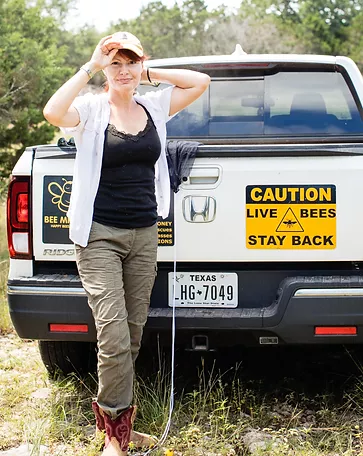
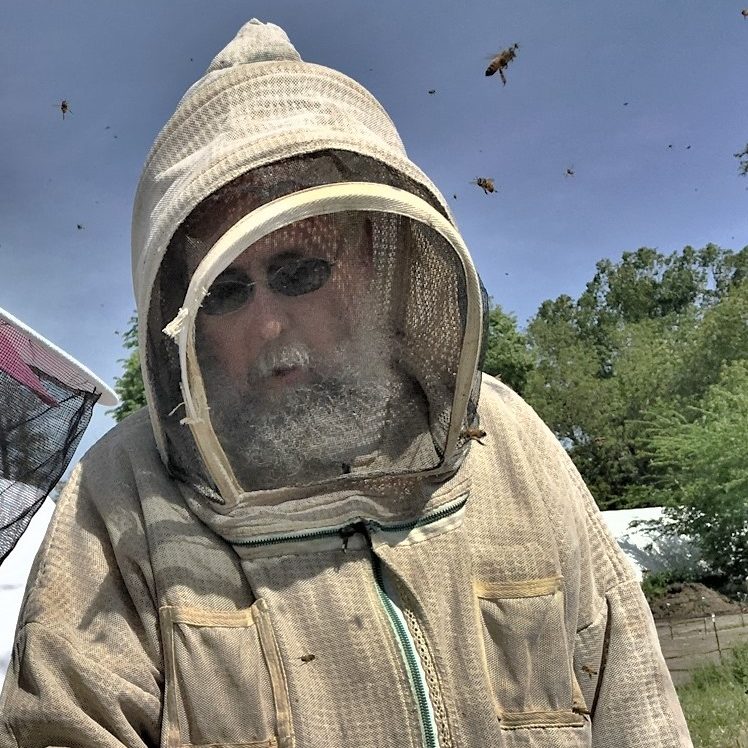
Michael Bush is an internationally recognized author and speaker on natural beekeeping. He is the author of “The Practical Beekeeper”, which has been published in five languages and is one of the authoritative sources on sustainable beekeeping without chemical treatments. His website (bushfarms.com) is an invaluable source of information on natural, chemical-free beekeeping and just plain beekeeping. The topics are based on the questions that come up on beekeeping forums over and over. The wisdom of his methods is evidenced by the fact that he successfully keeps bees through the harsh winters of Nebraska.
“His talks are like his writing, with more content, detail, and depth than one would think possible with such few words…his website and PowerPoint presentations are the gold standard for diverse and common sense beekeeping practices.” D. Stiglitz
Adrian Quiney is an RN and sideline beekeeper. He overwinters 60-80 colonies in the area around Hudson WI – a Wisconsin border town about 30 miles east of Minneapolis, MN. His area of interest is Biotechnical Beekeeping. This is a collective term for methods that exploit the weaknesses of the mite to control it without the use of chemical mite treatments. Save for an abandoned 3 week foray into sugar dusting about 10 years ago Adrian has never used chemical mite treatments.
The conventional wisdom is that Biotechnical Beekeeping alone cannot keep one’s bees alive. Combining brood breaks, conventional drone brood removal, Dutch/German drone brood removal, varroa resistant stock, and the use of stacked five-over-five nuc boxes has enabled Adrian to defy conventional wisdom. He keeps records of his overwintering survival numbers, by year and to date. From when he started in 2008 through April of 2021 his lifetime survival wintering totals are 457 colonies surviving through to spring, from a total of 604 colonies entering winter. That is an overall survival rate of 75%. He has been able to do this from an initial purchase in the first five years of only 5 packages of bees.
He credits Mel Disselkoen of Michigan for teaching him the value of brood breaks, and Mike Palmer of Vermont for introducing him to the value of nucs. Adrian has been giving talks about his methods and professing the value of nucs since 2012. That makes him a ten-yeared nuc professor…
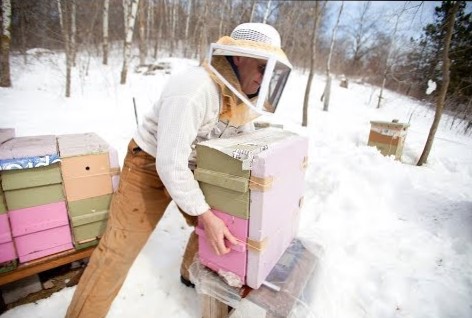
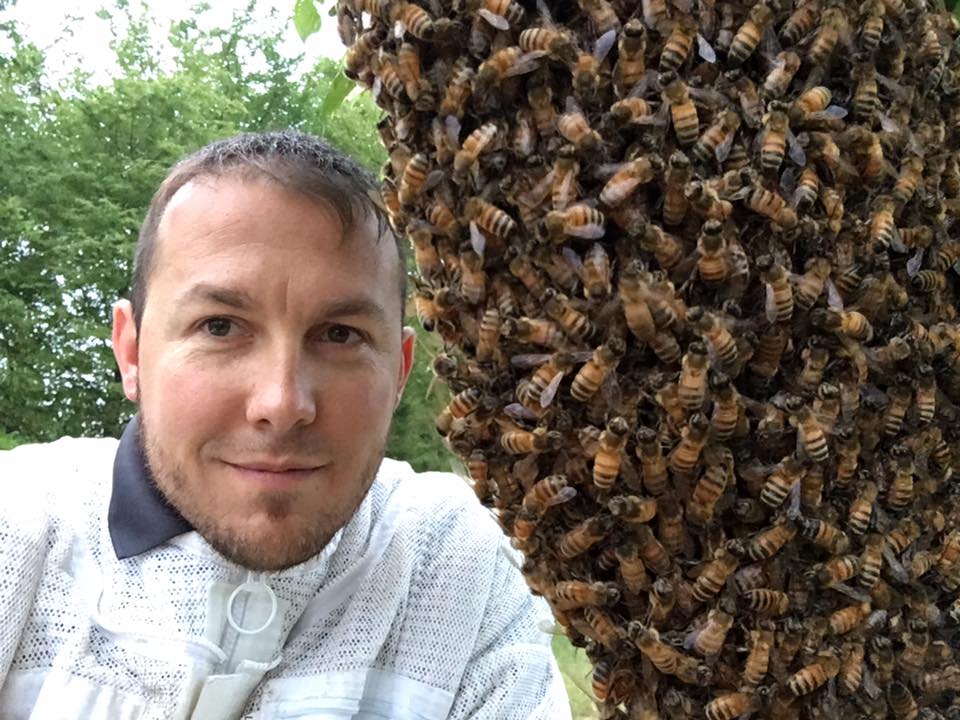
Cory Stevens has been keeping bees for fourteen years. He tends a twenty-seven acre farm in Bloomfield, MO, which he manages for wildlife and pollinator habitat. Cory and his wife Jaime manage Stevens Bee Company with the help of their two children Jade Olivia and Camden. You can check out Stevens Bee Company online at stevensbeeco.com or on Facebook. Cory is currently serving as President of Missouri State Beekeepers Association.
He was certified as a Master Beekeeper by EAS in 2013, and trained by Sue Cobey in 2014 to instrumentally inseminate queens. He slips bees into random conversation with strangers, and annoys his wife by constantly talking about bees. Cory is rounding third base finishing up an MS in entomology from University of Nebraska-Lincoln.
Les Crowder is an authentic Bee Whisperer, an expert beekeeper, professional educator and Head Teacher at the Bee Mindful Beekeeping Academy in Austin, TX, where he and Nathalie B. teach Natural Beekeeping.
He started beekeeping at 14, and is both a biologist and a true veteran of the beekeeping world. Earlier in his career, he worked for a commercial beekeeper with 4,000 hives. Ever since, he has looked for ways to eliminate toxic inputs in the hive. He now is an internationally recognized expert in Natural Beekeeping, and specializes in Top-Bar Hives. He wrote “Top-Bar Beekeeping: Organic Practices for Honey Bee Health”, an authoritative source for Natural, Mindful Beekeeping and a very popular book all over the world. He has been teaching highly popular Natural Beekeeping classes domestically and abroad for over 35 years (both in English and Spanish), and now offers a Professional Apprenticeship at Bee Mindful (www.Bee-Mindful.com).
Every Thursday at 5pm Central US Time, he co-hosts a free “Chat With The Mindful Beekeepers” with Nathalie B., where they answer beekeeping questions from all over the world, simultaneously on Instagram #BeeMindfulHoneyFarms (see past recordings there) and via ZOOM. Les was a honey bee inspector in New Mexico for 5 years, the President of the New Mexico Beekeepers Association multiple times, and now is the President of the Hays County Beekeepers Association, a Natural Beekeeping club in Austin, TX (join their Facebook group for Natural Beekeeping advice).


Terry Combs is a 100% chemical-free beekeeper when it comes to varroa control in his apiaries. He has been keeping bees for 55 years. He has the distinguished honor of holding a Boy Scout Beekeeping Badge as a youth, which entails many rigorous requirements prior to even receiving bees to keep. Though the badge is no longer part of the BSA program Terry continues his desire to this day regardless.
Prior to the 1996-97 season, Terry was running the chemical treadmill. Starting with a 83% loss in the Spring of 1997, Terry managed through the process to achieve 0% loss in the Spring of 2018. Achieving an average of 3% colony loss during this time his experience has proven effective in developing a practical hands-on approach to beekeeping in the treatment-free apiary.
Terry teaches four beekeeping classes on different subjects and two insect classes: one for adults and one for younger people at a local college. He frequently gives presentations for youth and the public on bees, beekeeping, spiders, and insects. In 2020 He furthered my beekeeping education by becoming a University of Montana Master Beekeeper. He lives in Keyesport, IL with his wife Debbie, two cats, a tank full of guppies and about three dozen beehives.